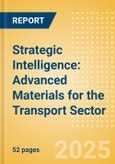Key Highlights
- The transport sector is the second largest contributor to global greenhouse gas (GHG) emissions. Advanced materials can help reduce this environmental impact, particularly through lightweighting, which substantially improves fuel consumption efficiency. Additionally, thermoplastics can be designed to be recycled multiple times without losing their properties, reducing both manufacturing emissions and end-of-life waste.
- The incorporation of advanced materials within automotive batteries improves many performance attributes. Additionally, there is an incentive to develop battery chemistries that minimize or even eliminate the use of cobalt, thereby reducing supply chain volatility. This relates to concerns over the concentration of cobalt in the Democratic Republic of Congo (DRC), as well as reports of child labor exploitation and other improper employment practices within its mining industry.
Scope
- This report looks at the top three trends driving the development of advanced materials in transport: vehicle lightweighting, sustainability, and electric vehicle batteries. It also includes industry use cases.
Reasons to Buy
- Manufacturers of cars, trains, and aircraft are exploring advanced materials, with several having surpassed the pilot testing stage to deploy them in commercial products. Advanced materials are expected to play a key role in market differentiation between regular and premium products. This report provides the ideal introduction to this disruptive theme.
Table of Contents
- Executive Summary
- Introduction
- Strategic Benefits of Advanced Materials for Transport
- Industry Use Cases
- Glossary
- Further Reading
- Report Authors
- Thematic Research Methodology
Companies Mentioned (Partial List)
A selection of companies mentioned in this report includes, but is not limited to:
- Advano
- Amprius
- ArcelorMittal
- Bcomp
- BMW
- BYD
- CATL
- CRRC Qiqihar
- Enovix
- Ford
- GE Aerospace
- Hyundai
- Joby Aviation
- Lufthansa Technik
- Luvly
- Mercedes-Benz
- MG Motor
- Nexeon
- Nippon Steel
- Nucor
- OneD Battery Sciences
- Posco
- Sila
- SSAB
- Stellantis
- Tata Steel
- Tesla
- Thyssenkrupp
- Toray Advanced Composites
- Volkswagen








